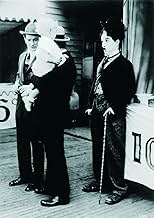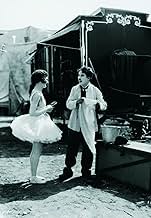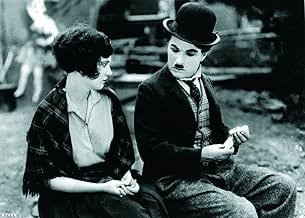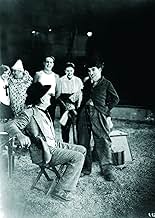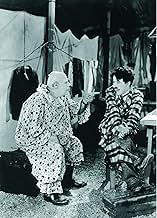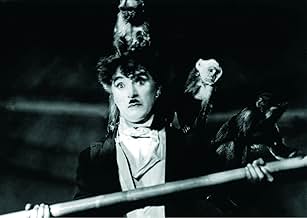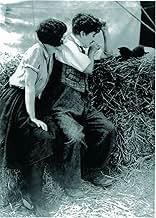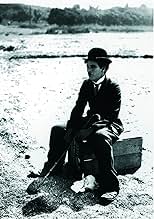VALUTAZIONE IMDb
8,1/10
37.680
LA TUA VALUTAZIONE
Charlot, il vagabondo, trova un lavoro e la ragazza dei suoi sogni in un circo.Charlot, il vagabondo, trova un lavoro e la ragazza dei suoi sogni in un circo.Charlot, il vagabondo, trova un lavoro e la ragazza dei suoi sogni in un circo.
- Premi
- 3 vittorie totali
Charles Chaplin
- A Tramp
- (as Charlie Chaplin)
Al Ernest Garcia
- The Circus Proprietor and Ring Master
- (as Allan Garcia)
Tiny Sandford
- The Head Property Man
- (as Stanley J. Sandford)
Albert Austin
- Clown
- (non citato nei titoli originali)
Chester A. Bachman
- Cop
- (non citato nei titoli originali)
Eugene Barry
- Cop
- (non citato nei titoli originali)
Jack Bernard
- Man in Circus Audience
- (non citato nei titoli originali)
Stanley Blystone
- Cop
- (non citato nei titoli originali)
Heinie Conklin
- Clown
- (non citato nei titoli originali)
Toraichi Kono
- Man in Circus Audience
- (partecipazione non confermata)
- (non citato nei titoli originali)
H.L. Kyle
- Man in Circus Audience
- (non citato nei titoli originali)
Betty Morrissey
- The Vanishing Lady
- (non citato nei titoli originali)
Recensioni in evidenza
Do not be mislead by the ne'er do wells who claim this movie as Chaplin's weakest.
The plot is not intricate, but Charlie doesn't need an intricate plot to make us laugh out loud. "The Circus" proves this.
Saying that this film is boring is perfectly ridiculous: there are many moments of pure Chaplin genius and, if nothing else, you simply must see this film for the tightrope-walking scene. No, it's not trick photography: that's really Charlie tightrope walking with no stuntmen of any kind. If THAT'S not exciting, I don't know what is.
Oh, and just as a side note, this film was made during a time when Charlie was going through a very dirty and very public divorce-- his ex successful at having his funds frozen during the divorce, he was sued for a million in back-taxes and faced possible jail time, AND the ENTIRE SET to the circus burned down in a fire.
He most definitely deserved the special Oscar he received for this film. That's right: OSCAR.
The plot is not intricate, but Charlie doesn't need an intricate plot to make us laugh out loud. "The Circus" proves this.
Saying that this film is boring is perfectly ridiculous: there are many moments of pure Chaplin genius and, if nothing else, you simply must see this film for the tightrope-walking scene. No, it's not trick photography: that's really Charlie tightrope walking with no stuntmen of any kind. If THAT'S not exciting, I don't know what is.
Oh, and just as a side note, this film was made during a time when Charlie was going through a very dirty and very public divorce-- his ex successful at having his funds frozen during the divorce, he was sued for a million in back-taxes and faced possible jail time, AND the ENTIRE SET to the circus burned down in a fire.
He most definitely deserved the special Oscar he received for this film. That's right: OSCAR.
The Little Tramp is chased into a circus tent during a performance; his antics prove funnier than those of the clowns, and the ringmaster hires him for the show.
When a comedian plays a character who is inadvertently hilarious, it can seem narcissistic: just check out Jerry Lewis's "The Errand Boy" where Lewis has his supporting cast praise the comic genius of the character played by Jerry Lewis. Despite this danger, and despite Chaplin's off-screen egotism, the premise plays beautifully, especially since The Little Tramp (though not Chaplin) is such a terrible comedian when he's trying to be one. My favorite moment is when the ringmaster demands the auditioning Tramp to be funny right that instant: the Tramp grins and shyly dances around a bit, gingerly falls down, puts his cane between his legs and meekly lifts himself back up. "Terrible!" roars his would-be employer.
This film has more self-awareness over comedy conventions that any other Chaplin I know of. The Tramp ineptly (but hilariously) performs a couple of standard comedy routines with the other circus clowns. Later, there's a funny twist to the old banana peel gag; and near the end he crashes into an old general store, looking as if he's thrust himself back into his old Keystone days. This is Chaplin's last true silent film, and the Keystone moment feels like a nostalgic farewell to the past.
"The Circus" is funny throughout, but the opening scenes are probably the best. There's a marvelous funhouse sequence and a priceless routine where The Tramp pretends to be a motorized dummy. (Has anyone seen the Swiss clock routine from "Your Show of Shows"?) He also falls in love with the ringmaster's cruelly treated daughter, which leads to a poignant ending.
I enjoyed the music, which Chaplin composed for this film in 1969. His scores are always repetitive; but they're also sweet and funny and they enhance the action. I could have done without the title-sequence song (which he sings himself)—something about looking up at rainbows. Otherwise, this comedy is near-perfect and holds its own against Chaplin's even greater features, "The Gold Rush," "City Lights" and "Modern Times."
When a comedian plays a character who is inadvertently hilarious, it can seem narcissistic: just check out Jerry Lewis's "The Errand Boy" where Lewis has his supporting cast praise the comic genius of the character played by Jerry Lewis. Despite this danger, and despite Chaplin's off-screen egotism, the premise plays beautifully, especially since The Little Tramp (though not Chaplin) is such a terrible comedian when he's trying to be one. My favorite moment is when the ringmaster demands the auditioning Tramp to be funny right that instant: the Tramp grins and shyly dances around a bit, gingerly falls down, puts his cane between his legs and meekly lifts himself back up. "Terrible!" roars his would-be employer.
This film has more self-awareness over comedy conventions that any other Chaplin I know of. The Tramp ineptly (but hilariously) performs a couple of standard comedy routines with the other circus clowns. Later, there's a funny twist to the old banana peel gag; and near the end he crashes into an old general store, looking as if he's thrust himself back into his old Keystone days. This is Chaplin's last true silent film, and the Keystone moment feels like a nostalgic farewell to the past.
"The Circus" is funny throughout, but the opening scenes are probably the best. There's a marvelous funhouse sequence and a priceless routine where The Tramp pretends to be a motorized dummy. (Has anyone seen the Swiss clock routine from "Your Show of Shows"?) He also falls in love with the ringmaster's cruelly treated daughter, which leads to a poignant ending.
I enjoyed the music, which Chaplin composed for this film in 1969. His scores are always repetitive; but they're also sweet and funny and they enhance the action. I could have done without the title-sequence song (which he sings himself)—something about looking up at rainbows. Otherwise, this comedy is near-perfect and holds its own against Chaplin's even greater features, "The Gold Rush," "City Lights" and "Modern Times."
The Circus is probably Chaplin's most underrated film. It is (easily) one of the funniest movies ever, and the inventiveness of such shots as the Mirror Maze scene and the closing sequence are nothing less than brilliant. What separates Chaplin from other comedian filmmakers is his ability to evoke a sense of pity and/or sympathy for his character. How can you watch the closing scenes of this film and, even after all of the laughter, NOT sense a bit of melancholia welling up in your heart? Truly one of the greats.
10lugonian
THE CIRCUS (United Artists, 1928) written, produced, directed and starring Charlie Chaplin, is a well-documented gem about circus life, mixing comedy and sentiment in the best Chaplin tradition, ranking this one of his finer yet neglected achievements of the 1920s.
In it, Chaplin plays a tramp who drifts at the midway of the circus after being wrongly accused of a theft and chased by a policeman. His escapades are mistaken as part of the act, which stirs roars of laughter from its audience. Because his circus has not been earning any profits, the ringmaster/owner (Allan Garcia) decides in hiring Charlie as his top attraction. However it is learned that Charlie is only funny whenever he blunders to his viewing public. Charlie soon learns from the abused Merna (Merna Kennedy), how valuable he really is, thus, making demands of quitting to his employer unless he ceases mistreating his stepdaughter, and offers him a higher salary, which he does. All goes well until Rex (Henry Crocker), "King of the High Wire," joins the circus and becomes attracted to Merna, causing Charlie to vie for her affections any which way he can.
With the circus being one of the more famous backdrops of many movie comedians and/or comedy teams ranging from W.C. Fields to Laurel & Hardy, The Marx Brothers to Martin and Lewis, THE CIRCUS stands out more for its ingenious use of difficult gags, comic timing and the effort that went into it to make every gag funny as well as realistically done. Rarely seen since its original theatrical release, THE CIRCUS came into full view again shortly after Chaplin's death in 1977. Newly scored and restored by Chaplin himself in 1968 (as mentioned in the new opening titles), with his singing of "Swing Little Girl" recorded on the soundtrack during the opening credits, my first experience with THE CIRCUS was in 1980 at New York City's Regency Theater, 68th Street and Broadway, where the revival theater (which no longer exists, having been demolished in 1998) paid a tribute to Chaplin with a series of shorts and features, including THE KID (1921), MODERN TIMES (1936) and THE GREAT DICTATOR (1940). Being surrounded by an appreciative audience laughing at a silent film made long ago indicated d THE CIRCUS has stood the test of time and what a comic genius Chaplin was, especially when demonstrating how difficult performing comedy can be as his character finds he has to be funny and isn't, and at the same time showing how poor he is as a comic to the circus staff and how funny he is as a bad comedian to the movie audience. While sitting in the dark movie theater of all ages at the Regency, the biggest laughs occurred during the opening as Chaplin hides from the law inside a fun house surrounded by mirrors and later making a fool out of the rival pickpocket (Steve Murphy) as they each attempt to fool the policeman by pretending to be movable statues; Charlie's encounter with a lion while locked inside the cage; and the biggest topper of all being Charlie doing a tight rope wire act and trying to balance himself while loose monkeys crawl all over him, thus disrupting his act. These same gags obviously brought forth many laughs in 1980 as it did in 1928, and continue to do so today. In between these gags comes pathos, which Chaplin also succeeds without hurting the continuity.
Chaplin staff players regulars such as Harry Bergman as the Clown, and Stanley Sanford as the Head Property lead fine support. Others in the cast include Betty Morrissey as The Vanishing Lady; George Davis as The Magician; John Rand, Albert Austin and Heinie Conklin in smaller roles.
In spite of its true greatness, it's hard to believe how underrated THE CIRCUS has become, not having the appreciation as Chaplin's own masterpieces, THE GOLD RUSH (1925) and CITY LIGHTS (1931), even by Chaplin himself. It's been said that during the making of THE CIRCUS, Chaplin was going through personal problems of his own, including divorce and the passing of his mother. It's even more ironic the elimination of THE CIRCUS from Chaplin's own autobiography published in 1964 while his other works were profiled to great extent, regardless of his nomination as Best Actor and Best Comedy Director by the Academy for 1927-28 awards. At least this has been amended through its reissue throughout the years to a new generation of movie lovers.
Distributed onto video cassette as part of the Chaplin centennial collection in 1989, THE CIRCUS, currently on DVD, made its presence known on television in the height of cable television, notably on the weekly series, "Dead Comics Society" on the Comedy Channel hosted by Kevin Kline around 1989-90, followed by American Movie Classics (1997-2000) and Turner Classic Movies where it made its debut in 2003.
THE CIRCUS, a 70 minute comedy, is a fine study to film students and anyone appreciating and supporting the art of silent comedy. (****)
In it, Chaplin plays a tramp who drifts at the midway of the circus after being wrongly accused of a theft and chased by a policeman. His escapades are mistaken as part of the act, which stirs roars of laughter from its audience. Because his circus has not been earning any profits, the ringmaster/owner (Allan Garcia) decides in hiring Charlie as his top attraction. However it is learned that Charlie is only funny whenever he blunders to his viewing public. Charlie soon learns from the abused Merna (Merna Kennedy), how valuable he really is, thus, making demands of quitting to his employer unless he ceases mistreating his stepdaughter, and offers him a higher salary, which he does. All goes well until Rex (Henry Crocker), "King of the High Wire," joins the circus and becomes attracted to Merna, causing Charlie to vie for her affections any which way he can.
With the circus being one of the more famous backdrops of many movie comedians and/or comedy teams ranging from W.C. Fields to Laurel & Hardy, The Marx Brothers to Martin and Lewis, THE CIRCUS stands out more for its ingenious use of difficult gags, comic timing and the effort that went into it to make every gag funny as well as realistically done. Rarely seen since its original theatrical release, THE CIRCUS came into full view again shortly after Chaplin's death in 1977. Newly scored and restored by Chaplin himself in 1968 (as mentioned in the new opening titles), with his singing of "Swing Little Girl" recorded on the soundtrack during the opening credits, my first experience with THE CIRCUS was in 1980 at New York City's Regency Theater, 68th Street and Broadway, where the revival theater (which no longer exists, having been demolished in 1998) paid a tribute to Chaplin with a series of shorts and features, including THE KID (1921), MODERN TIMES (1936) and THE GREAT DICTATOR (1940). Being surrounded by an appreciative audience laughing at a silent film made long ago indicated d THE CIRCUS has stood the test of time and what a comic genius Chaplin was, especially when demonstrating how difficult performing comedy can be as his character finds he has to be funny and isn't, and at the same time showing how poor he is as a comic to the circus staff and how funny he is as a bad comedian to the movie audience. While sitting in the dark movie theater of all ages at the Regency, the biggest laughs occurred during the opening as Chaplin hides from the law inside a fun house surrounded by mirrors and later making a fool out of the rival pickpocket (Steve Murphy) as they each attempt to fool the policeman by pretending to be movable statues; Charlie's encounter with a lion while locked inside the cage; and the biggest topper of all being Charlie doing a tight rope wire act and trying to balance himself while loose monkeys crawl all over him, thus disrupting his act. These same gags obviously brought forth many laughs in 1980 as it did in 1928, and continue to do so today. In between these gags comes pathos, which Chaplin also succeeds without hurting the continuity.
Chaplin staff players regulars such as Harry Bergman as the Clown, and Stanley Sanford as the Head Property lead fine support. Others in the cast include Betty Morrissey as The Vanishing Lady; George Davis as The Magician; John Rand, Albert Austin and Heinie Conklin in smaller roles.
In spite of its true greatness, it's hard to believe how underrated THE CIRCUS has become, not having the appreciation as Chaplin's own masterpieces, THE GOLD RUSH (1925) and CITY LIGHTS (1931), even by Chaplin himself. It's been said that during the making of THE CIRCUS, Chaplin was going through personal problems of his own, including divorce and the passing of his mother. It's even more ironic the elimination of THE CIRCUS from Chaplin's own autobiography published in 1964 while his other works were profiled to great extent, regardless of his nomination as Best Actor and Best Comedy Director by the Academy for 1927-28 awards. At least this has been amended through its reissue throughout the years to a new generation of movie lovers.
Distributed onto video cassette as part of the Chaplin centennial collection in 1989, THE CIRCUS, currently on DVD, made its presence known on television in the height of cable television, notably on the weekly series, "Dead Comics Society" on the Comedy Channel hosted by Kevin Kline around 1989-90, followed by American Movie Classics (1997-2000) and Turner Classic Movies where it made its debut in 2003.
THE CIRCUS, a 70 minute comedy, is a fine study to film students and anyone appreciating and supporting the art of silent comedy. (****)
The Circus was both my first silent film and the first film I've watched by Charles Chaplin. Being my first silent film i thought for sure i would be bored to death, but was i wrong. The film was really funny, made me laugh out loud. The comedy in this film is very different to the comedy in films now a days. Now a days most comedy films are big on the special effects and just lame humor. In the circus the actors have actual talent, they have to be very good at showing there emotion, like facial expressions and things like that.I was amazed on how well the movie was, Charlie Chaplin is great and i hope soon i can get my hands on some more of his films. I almost wish they could make a films like this today just maybe with some color, i think it'd be a great idea.
Lo sapevi?
- QuizIn the 1969 reissue, the 80-year-old Sir Charles Chaplin sang the title song.
- BlooperAfter the tramp washes the shaving cream from his face, he dries himself with a towel, but the towel never touches his face. (This is probably so that it won't mess up the stage makeup.)
- Citazioni
The Circus Proprietor and Ring Master: Go ahead and be funny.
- Versioni alternativeCharles Chaplin replaced the original credits of this film when he reissued it in 1969. In their place, there is an opening scene featuring Merna Kennedy on the trapeze while Chaplin sings a song, then the image fades to the credits of that version with no cast nor technical credits.
- ConnessioniFeatured in The Circus: Premiere (1928)
I più visti
Accedi per valutare e creare un elenco di titoli salvati per ottenere consigli personalizzati
Dettagli
- Data di uscita
- Paese di origine
- Siti ufficiali
- Lingue
- Celebre anche come
- The Circus
- Luoghi delle riprese
- Glendale, California, Stati Uniti(ending exterior scenes - the circus wagons depart south on Verdugo Rd. from Glenoaks Blvd.)
- Azienda produttrice
- Vedi altri crediti dell’azienda su IMDbPro
Botteghino
- Budget
- 900.000 USD (previsto)
- Lordo in tutto il mondo
- 33.854 USD
- Tempo di esecuzione1 ora 12 minuti
- Colore
- Mix di suoni
- Proporzioni
- 1.33 : 1
Contribuisci a questa pagina
Suggerisci una modifica o aggiungi i contenuti mancanti

